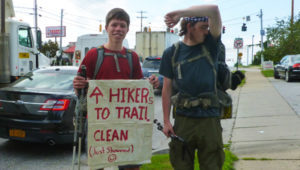“Hiker Trash” is a term many within the long-term hiking community take on with pride.
According to The Trek, a website dedicated to the Appalachian and Pacific Crest Trails, this phrase is used affectionately to refer to a hikers that have sunken down to a lower standard of living than the standard they lived at before embarking on the trail.
With the trail stretching 2,200 miles across 14 states from Georgia to Maine, it takes hikers an average of five to seven months to complete the trail. During those months, hikers are subject to extreme weather conditions, hunger, gear failure and many more obstacles that involve spending some money.

Cullowhee local, Jay Hinton on a trail run at Siler Bald in the Winding Stairs Gap section of the Appalachian Trail.
Photo courtesy of Jay Hinton
Cullowhee resident and avid hiker/trail runner, Jay Hinton, has completed day hikes, backpacked and runs on smaller sections of the trail in Northern GA, Western NC and in Virginia. In speaking about those who are capable of thru-hiking all 14 states, he explained that he envies those who pull it off and treat the journey as an opportunity to slow down and disconnect. With a wife and young kids, thru-hiking the trail in not in the cards for him in the near future.
“To hike the Applachian Trail, I think you need to be in some kind of transition of your life since it is such a time commitment,” said Hinton.
Bill Walker, a well-known hiker and author, thru-hiked the Appalachian Trail in 2005 at the age of 44, spending around $2,000 in equipment costs from the basics of durable shoes and a tent to water filters and hiker foods.
After spending a lot of money to get started, it seems only natural for hikers to seek out cheap things along the way to get them by. Without the luxuries of having a washing machine or a functioning toilet, hikers begin to find themselves lumped into this culture of Hiker Trash where some of the things most people take for granted are suddenly coveted.

Two hikers use humor and a simple sign to try to find their way back to the trail after a stop into town to freshen up
Photo courtesy of appalachiantrail.org
There are plenty of different ways to decipher who is a part of this hiking culture. Strategically choosing a restaurant in a pit stop town based on free WiFi, electrical outlets and the cheapest of foods is not only smart, but it also a key sign that you may be Hiker Trash.
At the heart of it, being one of the Hiker Trash group means much more than finding innovative ways to get things done with spending as little as possible. It is about a group of individuals who come together to create their own dialect, customs and lifestyle.
Hiking the Appalachian Trail even comes with a certain social code that includes the use of trail names. If you think about it, hikers go out in the elements a lot of the time with the mindset of leaving something behind, even if it is just for a short while.
Adopting trail names is a way that hikers accomplish this. It creates the opportunity to not be attached with your home life, stress of being a parent, stress from your job or anything else you are seeking solace from. Being called by your trail name is symbolic of a fresh start, a new journey and a new chapter of your life.
We spoke with a few hikers who were passing through Franklin on their way up to Maine and they shed some light on how they got their trail names.
Video produced by Kayla Minion and Rachel Plouse
A hiker that goes by the trail name, Sprout, wrote an insightful article about what just some of the values of the Hiker Trash culture embodies and it goes well beyond braving the elements in a frugal manner and silly sounding names.
One of the more obvious values is that if you are to be labeled with the title of “Hiker Trash” you must be willing to set out on adventures, push your limits and desire the thrill of new experiences.
Being one with the culture of being a long distance hiker involves the appreciation for solitude. While many hikers are relieved to be social with other hikers and exchange stories, it is important to appreciate the moments when you are out there on your own with only the Earth under your feet and the unknown in front of you.
From reading many personal accounts of thru-hikers, if there was one common trend it was community. It’s simply impossible to hike thousands of miles entirely alone. There is always strength in numbers whether it is for protection, to share the heavy load of gear or simply to have good company and be able to swap stories.
Above all, potentially, is perseverance. Achieving the bragging rights of hiking the entire Appalachian Trail is not for the weak. Only 20 percent of all hikers who begin the trail actually finish it. The only thing that can carry a person through such a long and grueling journey is their dedication and determination to getting to their own personal finish line. I can only assume that there is no greater satisfaction than walking away from the journey as a better version of yourself than when you first began it.
For a look at how a local town’s economy depends on the influx of hikers, check out the article, “Appalachian Trailhead 110: How Franklin, NC benefits from hikers“.


